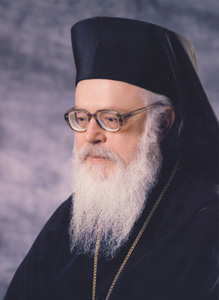 |
|
||
|
|||
Archbishop Anastasios of Albania to deliver Baccalaureate address
By David J. Craig
|
|
|
|
Archbishop Anastasios Photo by A. Emapatahe |
|
The roughly 400,000 refugees who poured into Albania in 1999 must have been shocked to find Orthodox Christians there opening up their homes and offering them food and clothes. Most of the refugees were Muslim, after all, and had just escaped Kosovo, a country ripped apart by ethnic fighting.
That Orthodox Christians, led by Archbishop Anastasios, helped organize the nation’s historic relief effort was remarkable also because 10 years earlier the Albanian Orthodox Church didn’t exist. Faith institutions in the country had been obliterated during 45 years of hard-line communist rule, and they began rebuilding in the early 1990s, when democratic reforms took hold.
For his role in resurrecting the Orthodox Church and protecting Kosovar refugees, Anastasios is considered a living saint by many Albanians. A scholar with a deep knowledge of Islam and a longtime proponent of intercultural dialogue, he led Orthodox clerics in raising more than $10 million from Western churches for humanitarian aid to Kosovar refugees in 1999.
“We are called to go beyond the limits of our closed communities, to transcend our prejudices, hesitations, and fears, and to witness to the risen Christ as far as we can, to go and meet our contemporaries and the burning problems they have to deal with,” Anastasios was quoted in the Australian newspaper The Advertiser last year. “This means helping every human being to attain freedom and dignity.”
Archbishop Anastasios will share his message of tolerance, faith, and love at BU when he delivers the University’s annual Baccalaureate address, entitled A Quest for Wisdom and Freedom, on Sunday, May 16, at 9 a.m. at Marsh Chapel. Later that morning, he will be presented with a Doctor of Humane Letters, honoris causa, at the All-University Commencement exercises.
Born Anastasios Yannoulatos in Piraeus, Greece, in 1929, Archbishop Anastasios devoted himself to Orthodox Christianity as a teenager. As a young theology student at Athens University in the 1950s, he emerged as a leader in a movement calling for Orthodox Christians worldwide to recommit themselves to the Church’s forgotten missionary tradition. In 1959, he founded Porefthendes (Go Ye), a journal devoted to promoting the Orthodox mission. He was ordained a priest and posted to Uganda in 1964, but was forced to return to Europe after successive bouts of malaria.
After several years spent studying theology at the Universities of Hamburg and Marburg in Germany, Yannoulatos was elected to the faculty of Athens University in 1972, and was ordained a bishop the same year. By 1981 he had sufficiently recovered his health to return to East Africa, where he served as archbishop until he was named archbishop of Albania in 1991.
Anastasios took responsibility for rebuilding Albania’s Orthodox Church at a time when the nation, which is the poorest in Europe, was just emerging from four and a half decades of international isolation imposed by a xenophobic communist dictatorship. Albania’s economy was backward by European standards, its infrastructure was dilapidated, and organized religion was almost nonexistent, as all religious practice had been outlawed in 1967.
Under Anastasios’ leadership, churches have been restored or rebuilt, a new generation of clergy is being educated, and religious schools have been opened. The newly reinvigorated Orthodox Church, meanwhile, continues to work aggressively to address poverty across the country.
“Archbishop Anastasios will find a friendly welcome at Boston University because of our very close connection with Holy Cross Greek Orthodox Seminary and Hellenic College,” says Rev. Robert Cummings Neville, who is dean of Marsh Chapel and University Chaplain, as well as an STH professor of philosophy, religion, and theology. “Archbishop Methodios of the Orthodox area in Boston is a graduate of Boston University, and I have myself taught many Orthodox students in theology. Archbishop Anastasios has been a missionary from one war-ridden area of the world to another, and he exemplifies the Christian principle of bearing the sorrows and sharing the joys of people different from oneself. The work he has done in Albania in recent years gives hope for the rebuilding of that country, and we have much to learn from him about the ways of peacemaking.”
![]()
13 May 2004
Boston University
Office of University Relations
